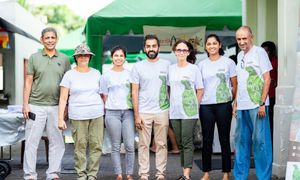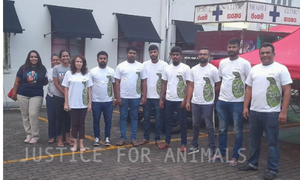
Dec 08 2022.
views 410Today on the Buzz I speak to a team which is really dedicated to their mission. I have seen many posts about Justice for Animals, but when I met them and spoke to them, their passion to help these animals really hit me deeply. This season, let’s also love those who can’t speak, but gives us unconditional love.

Where is your justice for animals situated and how did it come about?
In early 2019 I co-organized a media conference under the banner "Animals too have Rights" as part of a group called Justice for Animals.
In 2020 during the lockdowns, we started doing spay-neuter-vaccinate-treat-feed programmes under this name. As the demand for programmes increased the next logical progression was to register as a not-for-profit company under the same name.
How many doggies are there and how do you manage all the work?
Justice for Animals is not a shelter. Our goal is humane population control addressing the root cause of the homeless dog and cat population.
Our main programme is Rabies eradication via humane population control, which is spay-neuter-vaccinate-treat, and in some instances, we include a feeding component as well into the programme.
How do you manage finances?
Funding is the hardest part. Our work is funded by donations and fundraising events which we run throughout the year.
There are lots of people on social media feeding dogs and asking for funds. Are all these people genuinely helping the doggies in need?
Unfortunately as is the case with many "charity projects" it is best to do your homework before making contributions. Feeding is of course an important component of animal welfare and it does seem to be that the number of homeless animals is definitely on the rise.
Do you carry out sterilization projects?
Yes. Our main programme is Rabies eradication via humane population control. Our spay-neuter-vaccinate-treat programme meets the needs of low-income communities, especially those that live in rural areas. Since 2020 we have sterilized almost 10,000 dogs and cats.
How is the feedback from the immediate community?
The spay-neuter-vaccinate-treat programmes for low-income communities are very well received and attended. Regrettably, we are unable to meet the requests for programmes due to a lack of funds.

How can people reach out to you and help out?
We are on FB and Instagram. Our priority is receiving funding. Next, as we are a volunteer-based charity we depend on volunteers to help run fundraising events and animal welfare/feeding programmes.
FB - Justice for Animals
Sri Lanka
IG - @justiceforanimals.lk
In terms of finances, it’s a crucial time for all people. Lots of people are going through the same fate. How can we justify asking money to feed an animal when children and adults are not finding enough to eat?
People have a voice, a platform, to voice their pain, fear, hunger etc. Animals do not. Dogs and cats are sentient beings and they suffer and feel pain and hunger just as we do. As compassionate [human] beings we have to be their voice and speak on their behalf. The request for funds is justified as this is not just an animal welfare programme. It is an invaluable community service programme for low-income communities. With an estimated homeless/free-roaming dog population of 1.2 - 2 million, it is imperative that the root cause of overpopulation is addressed.
Only dogs? Or are there any other animals who are being looked after?
Our programme is spay-neuter for dogs and cats. However, we do have other animals/pets [rabbits, monkeys, rock squirrels, mongoose] that are brought to the programme for rabies vaccinations and treatments.
What would you tell those who only want purebreds?
"How do you not care about the abuse the mothers and fathers of these puppies go through?"
I find it mind-boggling that people who buy breeds do not care about the puppy mills and the deplorable conditions that most of the so-called "purebreds" come from.
0 Comments